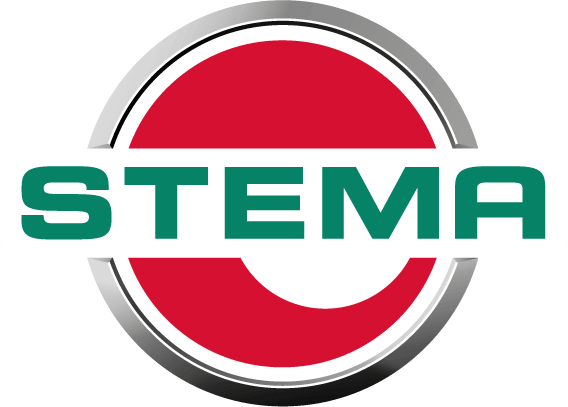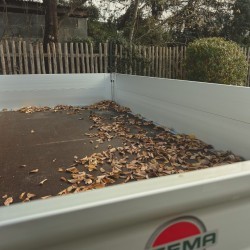Trailer Maintenance Tips for Autumn and Winter
Interview with the quality manager of STEMA on the topic of car trailer care.
Hello Mr Rode, you’ve been working in the field of quality management at STEMA for 19 years and will certainly have gained a wealth of experience over this time.
What do you think, does a car trailer require any maintenance at all?
Mr Rode: “Yes, of course, car trailers require maintenance. They are road-approved vehicles, and not just ‘beasts of burden’. In the absence of regular care and maintenance, serious road accidents can occur. What's more, you won't be able to enjoy the full functionality of your trailer for as long. Who wants that? A good trailer isn’t cheap, after all.”
This is why a large number of useful tips are documented in the operating manuals of the respective STEMA car trailers.
- Wilfried Rode
- Quality Officer and Service Manager
- – has been working at STEMA since 1996
- 01558 Großenhain
- T: +49 3522 30942004
- presse@stema.de
What should I pay particular attention to?
Mr Rode: “Our recommendations are very similar to those put forward by the ADAC where car maintenance is concerned. This means that you should treat your ‘companion’ to some tender loving care twice a year, ideally in the autumn and spring periods. In winter, road salt and stubborn dirt deposits should be thoroughly removed using a steam jet. Tests have demonstrated that these particles can act like sandpaper. Fertilisers, ammonia or substances containing lime also have an extremely caustic effect on metal and wooden surfaces. It’s best to use containers, covers, or other appropriate means for these types of loads.”
Are there any protective covers, tarpaulins or accessories that you would recommend to protect the trailer in the long term?
Mr Rode: ‘”Wooden floors should definitely be protected with PVC tarpaulins when transporting abrasive loads such as building rubble. STEMA offers accessories like the red drawbar cover (ZT00370). This cover is UV-resistant and protects the braking system from dirt during rain, ice, and snow. It’s simply attached using fastening hooks and a cord – but it’s only compatible with trailers that have a side-mounted support wheel. Where the transportation of caustic materials such as fertiliser, cement, or road salt is concerned, avoid direct contact with surfaces and clean thoroughly immediately after transport.
What about trailers that are frequently used on unpaved roads or in dusty environments? Do they require a different form of care?
Mr Rode: “The intensity of care and cleaning depends heavily on how often and in what conditions the trailer is used. Trailers that are frequently operated on unpaved roads or in dusty environments require more intensive maintenance and cleaning to prevent wear and to ensure their long-term functionality.”
Speaking of ‘dryness’ – do I really need to store my trailer indoors or have it covered in winter?
Mr Rode: “Storing your trailer in a barn or garage is, of course, beneficial. However, the most important thing – regardless of the storage method employed – is to prevent the accumulation of water. Poor ventilation and high levels of humidity can cause what they call white rust to form on galvanised surfaces. Simply covering the trailer only provides limited protection.”
What cleaning and care products should I use?
Mr Rode: “Use only clear water to clean your trailer, with the optional addition of a neutral cleaning agent. Afterwards, apply a standard neutral preservative or protective wax. However, it’s crucial to allow the trailer to air-dry beforehand.”
What if I only pick up on your tips today and small rust spots or white rust spots have already formed as a result of my previous actions?
Mr Rode: “Small superficial rust deposits are generally unproblematic. They can be easily removed, and the surface resealed, for instance, using zinc paint, followed by the application of standard car protection waxes. White rust is not an indicator of the quality of the galvanisation and in the majority of cases is only a cosmetic issue. Its occurrence is strongly linked to the weather conditions, especially during the autumn and winter months. White rust can be removed using a nylon brush or a non-metallic sponge.”
Which signs provide an indication that maintenance is urgently required?
Mr Rode: "There are a few warning signs that users should take seriously such as sudden rattling noises, unstable driving behaviour (e.g. if the trailer sways when you are driving straight), insufficient braking performance where braked trailers are in use, or a malfunctioning handbrake. Another warning sign involves the overheating of the tyres, which can be identified by a yellow-blue discoloration. In such cases the trailer should be immediately inspected in a specialist workshop.”
STEMA mainly uses phenolic resin-coated wooden floors as trailer floors, which are water-repellent. Can I additionally maintain the wooden floor?
Mr Rode: "The floors used by STEMA are tested in terms of their durability and stability. The best way to maintain them, as already mentioned, is to prevent standing water. Any accumulation of water should be allowed to drain away. STEMA has provided its own drainage holes in the floor for this purpose. Remove dirt, such as leaves (tannins), base metal objects (which can rust), or similar items, as they can affect the floor's surface and leave corresponding marks. In the case of scratches and abrasions— i.e. normal signs of wear and tear—treat the affected areas of the wooden floor with a wood glaze. Where deeper damage has occurred, it is best to repair it first using a wood filler. It is less advisable to use paint or varnish for refinishing. These can seal the floor's surface too tightly, potentially leading to rotting in the wooden layers."
What else should I keep in mind?
Mr Rode: "Regular maintenance according to the trailer's operating manual is essential for the preservation of the trailer’s value and in order to ensure your safety. This includes greasing the lubrication points on the tow hitch coupling, regularly checking the tyre pressure and tread, and inspecting for rust if the trailer is stationary for extended periods."
Thank you very much Mr Rode. And we wish safe travels through autumn and winter to all our STEMA trailer enthusiasts!
Newsletter & Contact
- Pressekontakt
- Riesaer Straße 50
- 01558 Großenhain
- T +49 3522 30 94 61
- presse@stema.de


